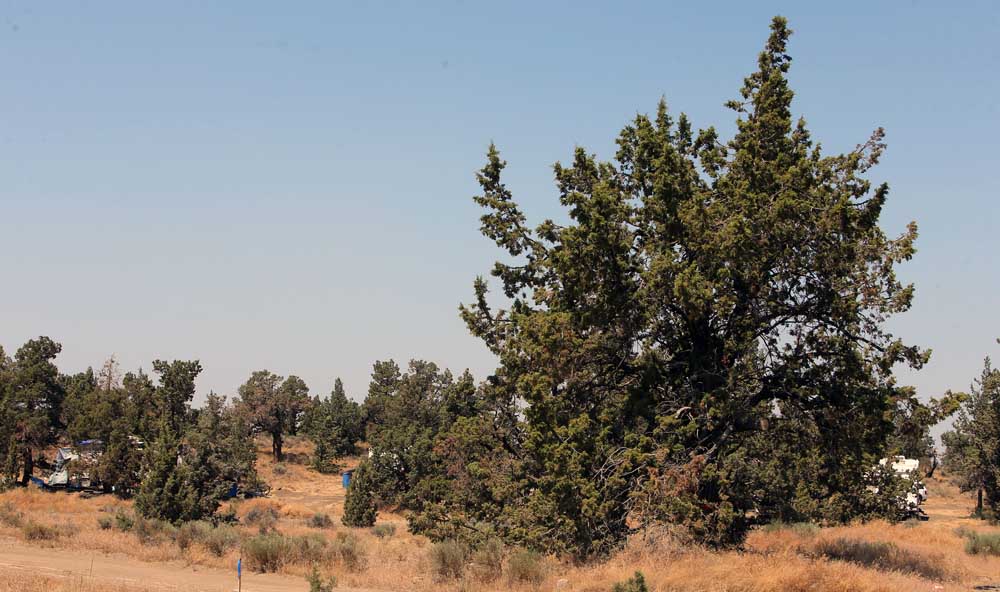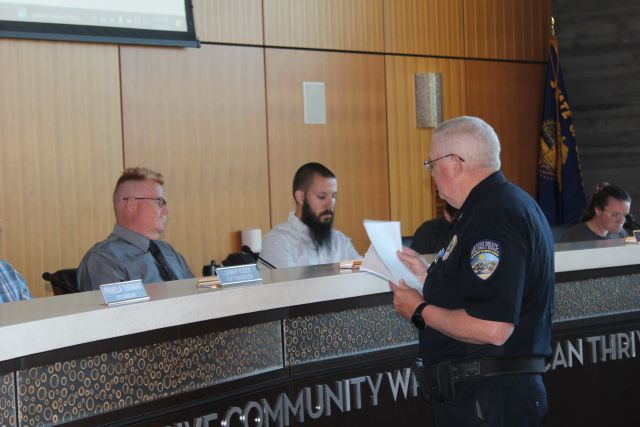Homeless camps in Junipers east of Redmond next on list of public land sweeps
Published 5:45 am Friday, April 25, 2025

- Campsites rest between juniper trees in an area north of state Highway 126 in Redmond. This land is part of a 45-acre parcel on the eastern edge of Redmond that Deschutes County has identified to establish a managed homeless camp.
Amid a push by local government authorities to remove or consolidate the region’s largest homeless encampments on public lands outside cities, people living in the juniper forest east of Redmond may be the next to be forced to move.
Deschutes County staff asked the Deschutes County Commission to address a code enforcement complaint lodged by a Redmond resident in September against a large county property east of the city, facilitating an ongoing debate about how to address homeless camps deemed public health and safety hazards when people have no other place to go.
The hundreds of acres of land subject to the complaint is part of a 1,600-acre industrial property on Redmond’s fringe. The north end is home to the new Negus Transfer Station for garbage, and the south end, near the highway, is the future home to the CORE3 project, a regional emergency coordination center and training facility.
Trending
Homelessness east of Redmond is holding up plans for a county land swap of 127 acres with the Oregon Department of State Lands for property to expand the Deschutes County Fair & Expo Center. Neither the pending land swap parcels or the coordination center property are part of the code enforcement case.
But the majority of members on the Deschutes County Commission have a strong desire to “turn the corner” on removing public land encampments.
“We need to proceed,” said Commissioner Tony DeBone. “We need to not be blown out by unsanctioned, unauthorized camping.”
However, the board did not give official direction to staff on how to proceed with the code enforcement, instead deferring the decision to next week.
The discussion mirrored the board’s homelessness debate from last summer, when it voted 2-1 to move forward with a managed homeless camp facility on a 45-acre property in east Redmond. The county and city of Redmond have been collaborating on the project since then.
DeBone was the lone opposing vote, fearing the county would sink too much time and money into the project. On Monday he repeated his desire for a simpler alternative: a structured “long-term visitor area” with low costs and services limited to garbage, water and bathrooms.
Trending
“It’s not a big solution, but it’s a place for people,” he said.
Deschutes County Community Development Director Peter Gutowsky said his department has identified the county’s property as “an imminent public health and safety hazard.” Violations include the improper discharge of human waste and sewage, open fires and wood stoves, and structures not up to code.
“The lack of approved sanitary disposal systems and unapproved structures for human habitation warrant immediate attention,” he wrote in a recent memo.
In 2023, the county filed a similar complaint against its own property north of Bend at Juniper Ridge, citing a large encampment spanning dozens of acres known as “Dirt World.” The county crafted a plan to clear the encampment but never followed through.
Potential legal implications around homeless camp sweeps have changed since then. In 2024 the U.S. Supreme Court sided with the city of Grants Pass in a case that weighed the constitutionality of removing people camping living in public places if there is nowhere else to go. The decision gave local governments more confidence in enforcement measures.
Potential removal of camps east of Redmond comes alongside looming closures of two larger public land encampments in Deschutes County. The city of Bend and the county have plans to consolidate and close Juniper Ridge to camping by the end of 2026, first setting up a temporary “safe-stay” area off of U.S. Highway 97. South of Bend, the U.S. Forest Service has plans to close the area along China Hat Road on May 1 for a forest management project. An estimated 100-200 people live in each of those areas.
Erik Kropp, deputy county administrator, recommended the county put code enforcement on hold for the large property east of Redmond. He pointed out that the county has prioritized tackling encampments at Juniper Ridge, as well as the coordination center property and the land swap property. And until the county opens the planned managed camp in east Redmond, there is no alternative location where people can go, he said.
The managed camp — which will have capacity for a “significant number of people” but may not be open until Thanksgiving — should weigh into the county’s decision on code enforcement, said Commissioner Phil Chang. He argued the county is at least partially responsible for creating a situation of large unauthorized encampments by not being willing to make investments in facilities or push for projects in the face of opposition.
Without more investments, the problems will continue, Chang said.
“If you move people out of an unauthorized camping location and there is not a pathway out of homelessness for them, they will end up somewhere else, causing more code complaints from somebody else,” he said.
Commissioner Patti Adair clashed with Chang, arguing he had glossed over important projects the county has supported like shelters and safe parking. On Monday, the county approved a ground lease for a 75-unit supportive housing development near Highway 126, adjacent to the property for the managed camp and the 20-unit transitional shelter Oasis Village.
But no matter what services are available, there will still be people choosing to live on public lands — and the county has let it go on too long, Adair said.
“What’s our end game?” she said. “Where are we actually going to turn the corner?”









